Omega Tribe | Interview | ‘Angry Songs’ is anarchist punk at its finest
Omega Tribe is an anarcho-punk band formed by a group of secondary school friends from Barnet, North London, in 1981. Crass Records recently reissued their anti-establishment classic, ‘Angry Songs’.
Their first demo was recorded in March 1982. It found its way to the members of Crass, who selected the song ‘Nature Wonder’ for the ‘Bullshit Detector Two’ compilation. ‘Angry Songs’ was released on Crass Records in 1982. More releases followed, including an album ‘No Love Lost’ and an EP ‘It’s a Hard Life’ as well as a live tape. The band went through many changes in line up during their brief years in the 20th century and stopped playing together in 1985. They re-formed to perform at Vi Subversa’s 60th birthday and toured under the name ‘Charlie’ during the 90s. In 2016 founding members Daryl and Hugh agreed to get the band back together and hit the road again. Following this the band have released a six-track EP, ‘Out of my System’ and the album ‘New Peace Movement’ was released to critical success via Grow Your Own Records.
Punk pioneers Crass continue their vinyl reissue series, repressing their limited releases of adjacent artists through Crass Records, in association with One Little Independent Records. Following records from Honey Bane and Jane Gregory in March, reissues from Captain Sensible and Omega Tribe were released on August 26th. The series, including over twenty bands and solo artists recorded at the legendary Southern Studios and produced by Penny Rimbaud, continues with two historic pieces of the Crass Records catalogue; anarcho-punk outfit Omega Tribe’s debut release ‘Angry Songs’, and cult icon Captain Sensible’s ‘This is Your Captain Speaking’. The anti-establishment themes explored by both artists remains as pertinent today as they were upon their release over forty years ago.
‘Angry Songs’ by Omega Tribe is anarchist punk at its finest, with powerful unrelenting lyricism, caustic riffs and an immediacy that came to define the genre. It was produced by Penny Rimbaud plus Pete Fender and included Hugh Vivian on guitar and vocals, Daryl Hardcastle on bass, Pete Fender on guitar, and Pete Shepherd on drums. The band have recently reinvented themselves, are creating and releasing new music, and they have a new album out.
The band told us that ‘Angry Songs’ was “made many years ago when we were very young and had limited experience of the world. A dominant narrative of the time was the perceived likelihood of nuclear Armageddon. Many young people felt this sense of impending doom at the time, and, once punk rock had ceased to be the latest fashion trend, many bands remained steadfastly focused on this pessimistic theme.
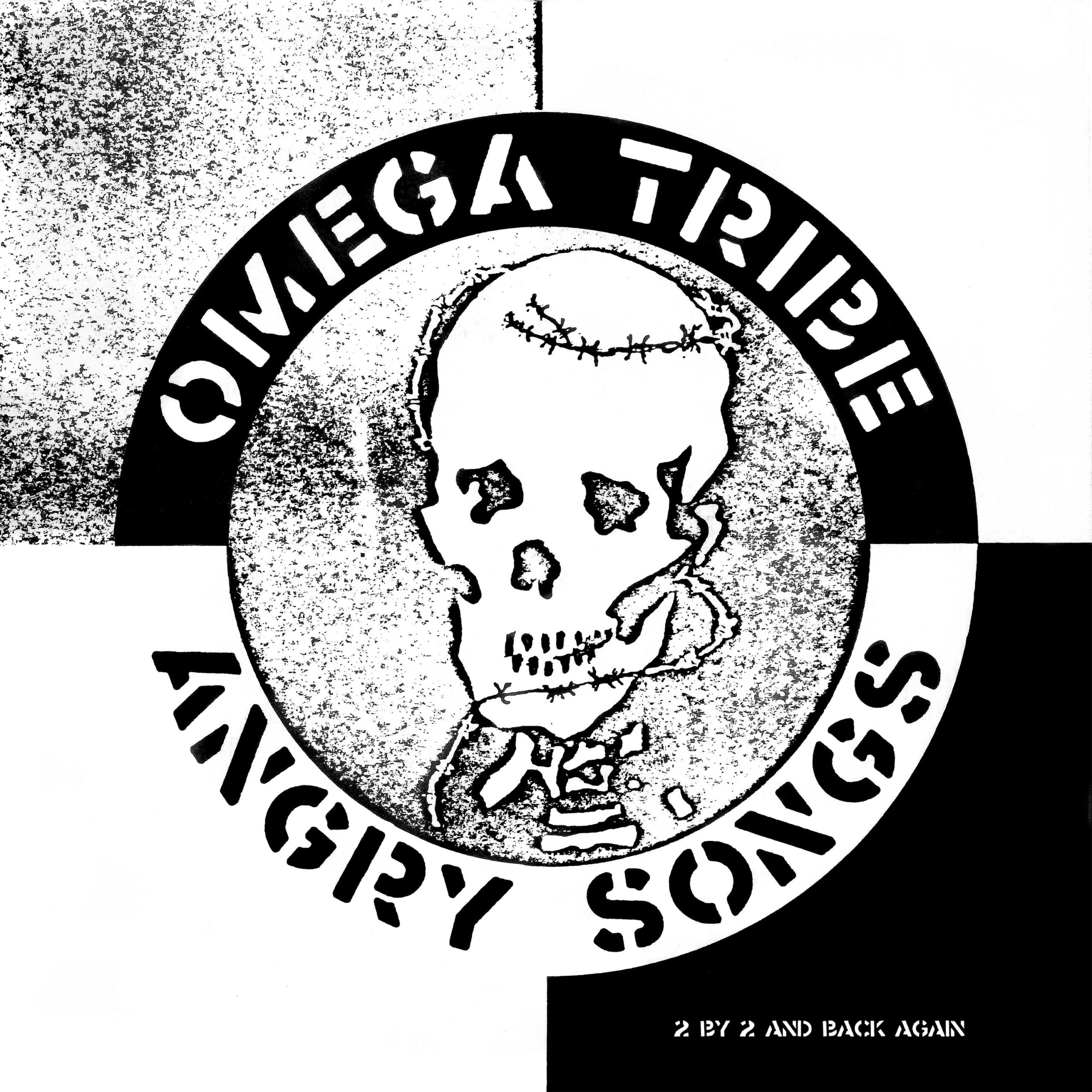
“If Omega Tribe is about anything it could be that transforming a space into somewhere joyous, inclusive and powerful”
Are you excited about the upcoming reissue of ‘Angry Songs’?
Emma Page: It’s a very different experience for me, not being in the band when the original release was out. So yes, I’m very excited and so proud to be part of it all.
Daryl Hardcastle: I find it interesting as the songs are very good and still relevant 40 years later. It seems to be getting a good response and I’m looking forward to the feedback we get after so many decades.
Let’s start at the beginning, how did you first get interested in music?
Hugh Vivian: Well, I’m not sure what was being played while I was in my mother’s womb, but I’ve always loved a song. My sister had those Top of the Pops cover version LPs – ‘Bikini clad girl on the front…’ – which were some of the first records I engaged with.
Emma Page: I was brought up in a house filled with music so my love for music goes back as far as I can remember. My parents danced to old 50s rock ‘n’ roll vinyl and 60’s beat bands, which I adored. I started collecting vinyl when I was very young and continue to do so now. I started my first band when I was just 12 years old and by the age of 16 I was already touring.
Daryl Hardcastle: It’s difficult to remember but my dad loved rock ‘n’ roll and I heard that being played all the time as I grew up. Eventually I heard of punk and started buying the records.
If we would get back in time and see your room, what kind of records would we find?
Hugh Vivian: Depends when you were looking, I’m not going pre-78! But you would find records that could be described as “alternative” I suppose, lots of “Pay No More Than’s”.
Emma Page: Pretty much only small label underground bands and obscure noise…the same as you would find today!
Daryl Hardcastle: I was a great fan of The Jam. Also the Damned, Ian Dury and the usual anarcho suspects; Crass, Poison Girls et cetera.
Did you follow any fanzines at the time?
Daryl Hardcastle: Yes. I loved buying fanzines and still have many of them. I did one myself called Realities of Society, which had an interview with Crass and Poison Girls in it. I was greatly helped in getting it printed and distributed by the lovely late Lance d’Boyle.
Hugh Vivian: Not really, I read whatever crossed my path though. I would often buy one at a gig.
Emma Page: I always picked them up from gigs and record shops, but I didn’t follow any specific zines.
How did you first hear Crass?
Emma Page: I first heard ‘Stations’, ‘Penis Envy’ and the ‘Zounds’ EP at a friend’s house in the early 80s when I was very young. I remember my first look at the artwork, it was like nothing I’ve ever seen before! Later in life Crass became the soundtrack of when I finally first took control and really started to live my true and best life.
Hugh Vivian: My friends and Omega Tribe band mates Daryl and Peter were fans so through them I think. I was never really a fan, although I respected what they did. ‘Reality Asylum’ was probably the first record of theirs I heard.
Daryl Hardcastle: Myself and my best mate Peter used to spend every Saturday afternoon at Small Wonder records where I got a copy of ‘Feeding of the 5000’. This was played to death and we started going to Crass and Poison Girls gigs regularly.
You originally started as Deadly Game and eventually changed your name to Omega Tribe. Can you elaborate on the formation of the band?
Hugh Vivian: I don’t ever remember that name. Other than that, it was what Peter’s two brothers’ band was called. I remember Daryl and Peter were playing with my friend Mick, they didn’t have a vocalist or a guitarist so he was helping out – maybe that was “Deadly Game?” – and then a drummer called David joined and so did I and a vocalist called Colin (he didn’t last long due to his remarkable ability to never be in time with anyone else, starting the line in completely random places, I believe he has now elevated this approach to music through his piano and saxophone playing, truly innovative!).
Daryl Hardcastle: I can’t actually remember
Daryl Hardcastle: I can’t actually remember that but I do remember Hugh and I sitting in my bedroom thinking of names for a band. Hugh said he would come round tomorrow with 3 ideas. One of these was Omega Tribe and we went for it. We only wish we could remember the other two just out of interest but we can’t!
How do you recall those early days of gigging?
Hugh Vivian: Very po-faced, over serious, sticky floors, always a hint of violence in the air, wordless – as in the bands didn’t speak to the audience other than “we’re Omega Tribe” and “this one’s called…” It got better though. If Omega Tribe is about anything it could be transforming a space into somewhere joyous, inclusive and powerful.
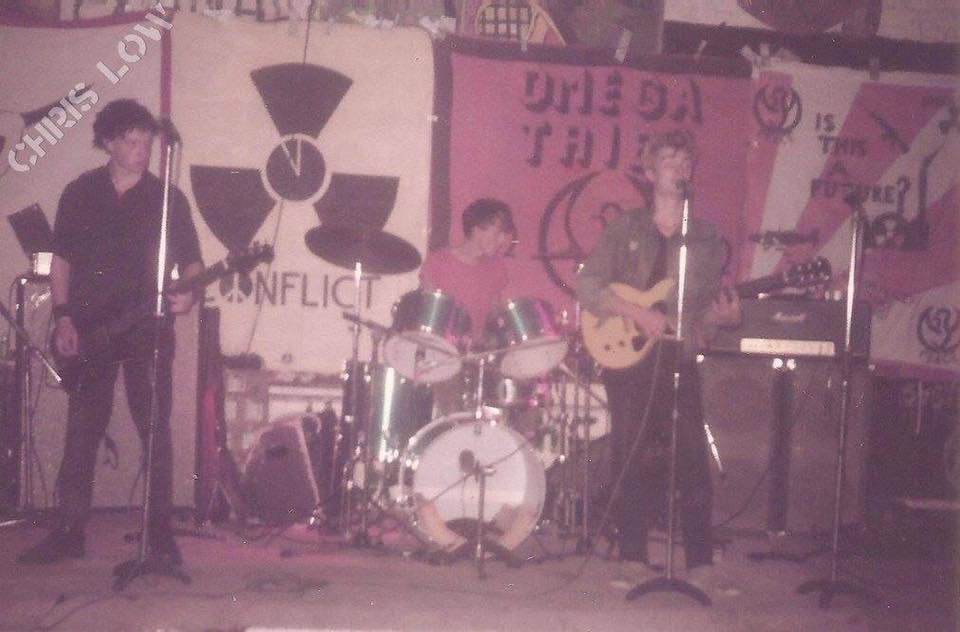
Tell us about your first recorded demo from March 1982…
Hugh Vivian: Our friend Pete Fender was very important in our story. He had his 4-track recording studio in the basement of his house in Leytonstone (the house incidentally where the Poison Girls lived and worked) and he recorded all our demos at that time.
Who of Crass heard you and what led to being featured on the ‘Bullshit Detector Two’ with your track, ‘Nature Wonder’?
Hugh Vivian: Daryl cultivated a relationship with Penny, and we would visit Dial House with our demos, and would get anyone who happened to be there to listen. I think our involvement with Crass was due to his relentless sycophancy! I enjoyed visiting there, endless tea and roll ups.
Daryl Hardcastle: I realised that Crass were quite uniquely different from other punk bands of the time and decided to make a point of contacting them in the hope of maybe being on ‘Bullshit Detector’ or something? I met Penny Rimbaud at a gig and started contact.
Pete Fender joined you later on…
Hugh Vivian: Pete joined us after ‘Angry Songs’ was released, although he played on the record and was always very supportive of the project.
Daryl Hardcastle: I first met Pete when I was interviewing Poison Girls for my fanzine and we hit it off and the rest is history!
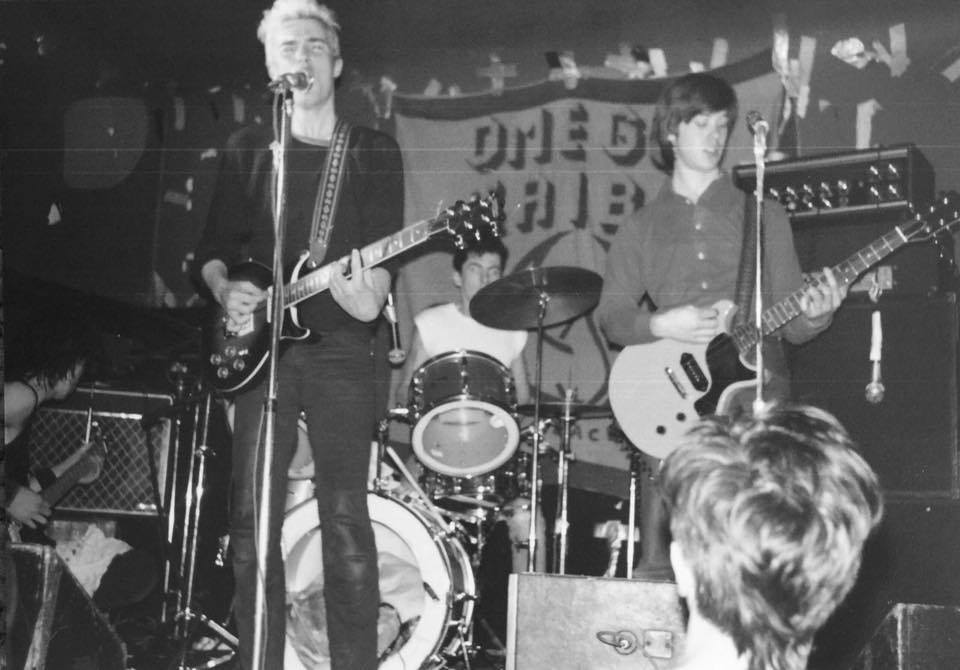
This line-up recorded your debut EP, ‘Angry Songs’. What’s the story behind it? What are some of the favourite memories from working on it?
Hugh Vivian: As above, we were still a three-piece at this point. It was quick, two days I believe. Southern Studios was pretty local for us, my mum grew up in Palmers Green. I remember bundling on the sofa, I was a child really! I liked how the ideas flowed quickly and were put into action, Pete’s musicianship was invaluable, drums, lead guitar, piano, harmonies, and Penny’s ideas too, the megaphone vocals, and his high harmonies!
Your ‘No Love Lost’ followed. What do you recall from working on your album?
Hugh Vivian: I think it was a good job to get that done so quickly, I think there were four days of recording, massive respect to Pete Fender for overseeing that. And us too, we were inventive I think and quite creative off our (my) limited abilities, but I know I put everything I had into that work.
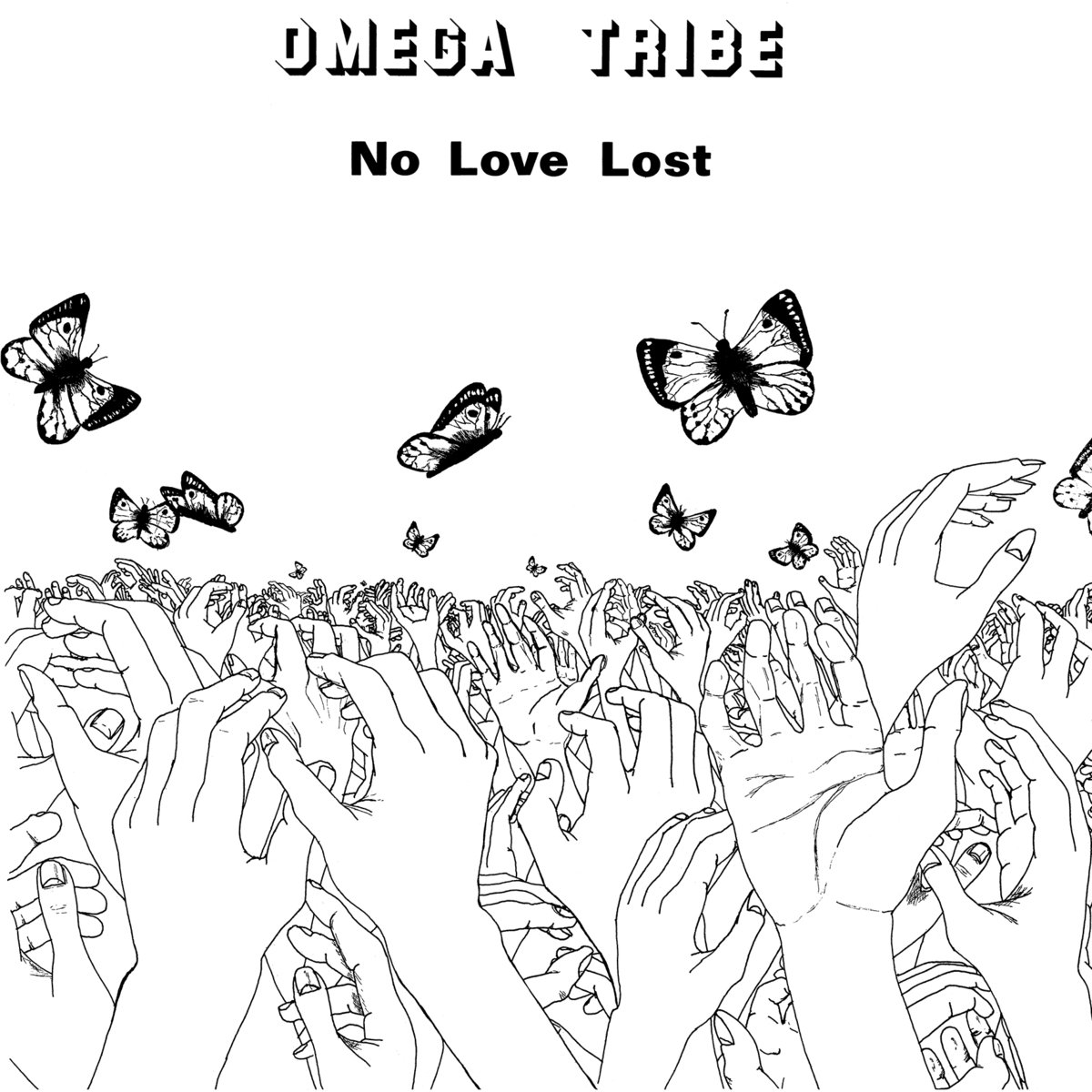
Line-up changed after the album was out. What was happening at the time?
Hugh Vivian: We got stuck. We were playing the same set over and over and couldn’t seem to work in new material. Then we recorded new stuff and (although it was, looking back, pretty good) couldn’t agree musically. So Pete left us to it and we got a new drummer, Peter (not Pete) moving to percussion, and Jane joined us playing saxophone and flute. The lovely and much missed Toby also joined us for a while and we had some fun for a year or so.
Tell us about a single titled ‘It’s A Hard Life’ from 1984?
Hugh Vivian: Produced by Paul Ellis – session musician and sometime keys player for Crass – for a commercial sound in an attempt to grow the audience. It was a song that we’d recorded with Pete Fender prior to our separation but this was a more ‘80s’ version (the recording with Pete is on our ‘Make Tea not War’ collection). We also did a 12-inch extended disco remix, which is proper punk.
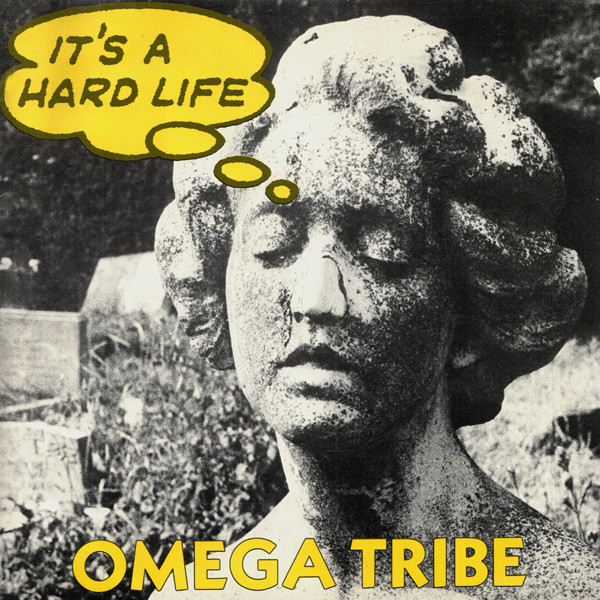
‘Live at the Clarendon’ is another testament of the raw power you had in the band… are there any more unreleased tapes by the band?
Hugh Vivian: Probably, but I don’t have them! Whoever got the Southern Masters has our last 20th century work, ‘Hip Hip Hooray’ and ‘In Limbo’ for a single that was never released – I don’t think Penny rated it – I doubt it’ll ever see the light of day.
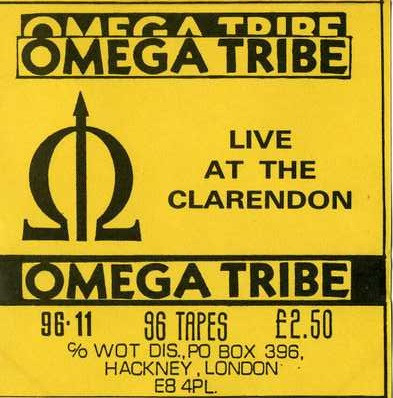
Looking back, what was the highlight of your time in the band?
Hugh Vivian: From the last century – Stonehenge. What a privilege to play that. But honestly, most of my highlights are this century. We’ve been playing live as Omega Tribe since 2016 so have been together longer this century than last. And while there is a big nostalgia trip, I think we are creating new stuff that is much better than our youthful work. I’m very engaged with our new work; we have a new album out called ‘New Peace Movement’ on Grow Your Own Records. I’m more interested in looking forward, the best is yet to come!
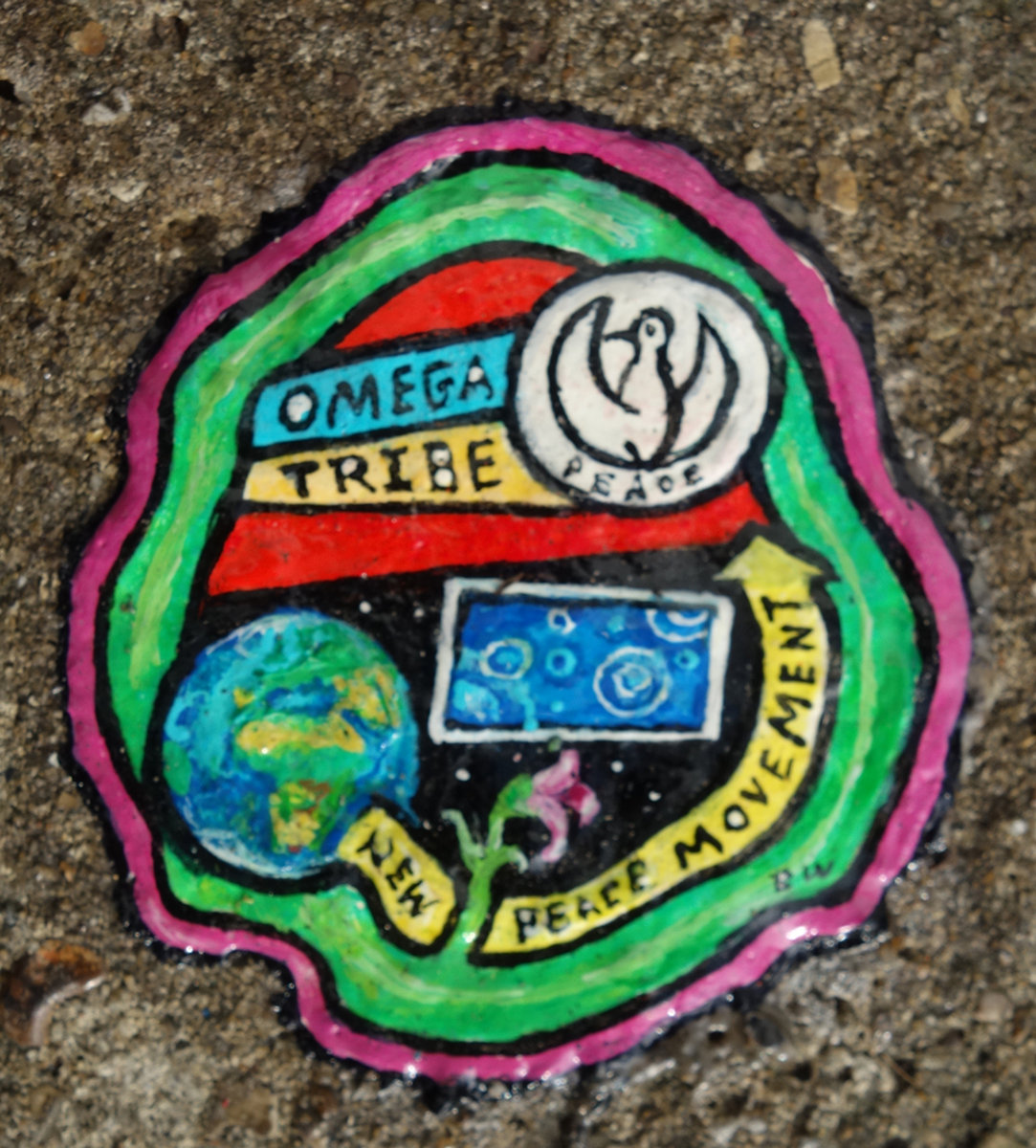
Emma Page: For me just being in Omega Tribe and touring the country with some amazing people are the highlights. I love the music we’re making now and the words Hugh writes are so relevant – they really need to be said. I agree with Hugh… the best is yet to come!
What currently occupies your life?
Hugh Vivian: Writing, poetry, music, reading, learning, trying to be a force for positive change. I must say that the band is going well and while we are not selling records like it was 1982 (who pays for music anymore?) the responses we have had to our work all over the place make it very rewarding.
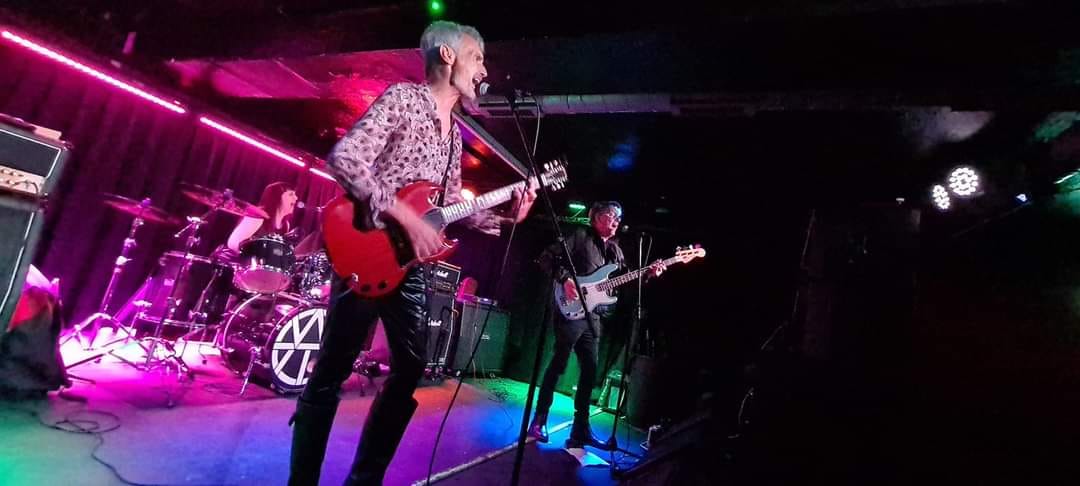
Emma Page: Gigging, recording, travelling and continuing with my LGBTQ+ activism doing my bit to promote positivity and change for transgender people in the punk scene and being visible for other trans musicians.
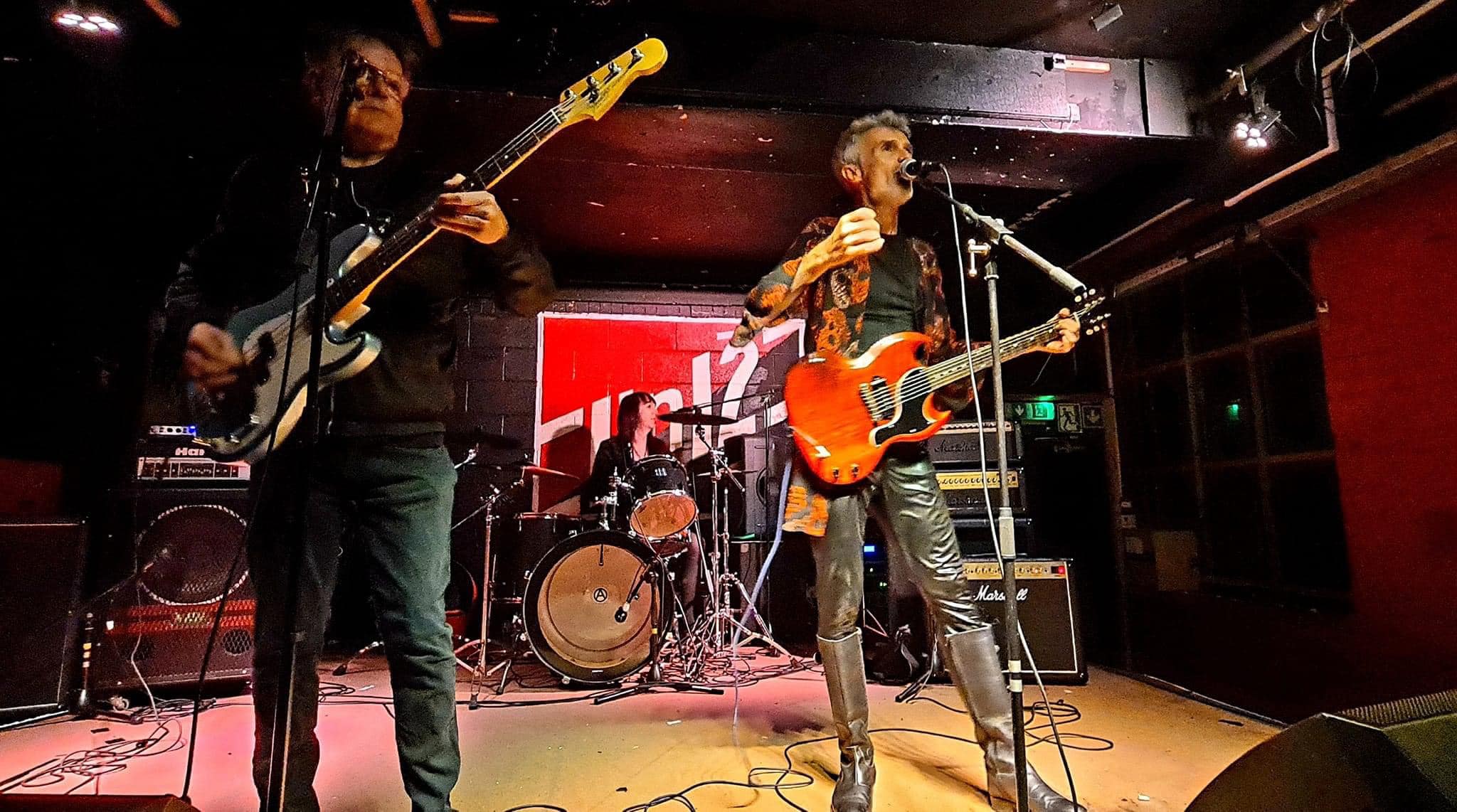
Thank you. Last word is yours.
Hugh Vivian: Thank you.
Emma Page: Support venues and bands who promote safe and inclusive gigs for ALL women and non-binary people! Thank you.
Klemen Breznikar
Headline photo: Omega Tribe | Rosebery Avenue Peace Centre, 1983 | Photo by Jim Wafford
Omega Tribe Facebook / Instagram / Bandcamp
One Little Independent Records Official Website / Facebook / Instagram / Twitter / Bandcamp / YouTube
Penny Rimbaud | Interview | “I influence myself the most when it comes to anarchism”

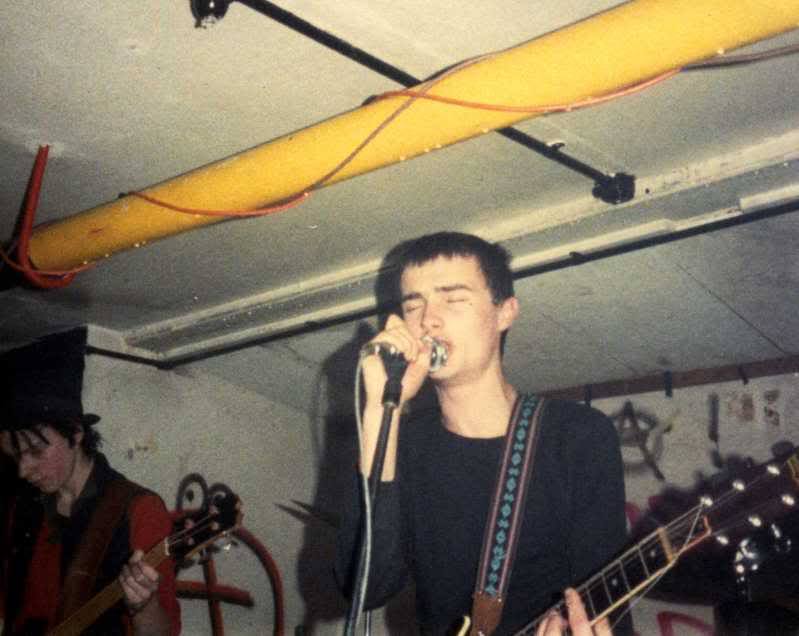
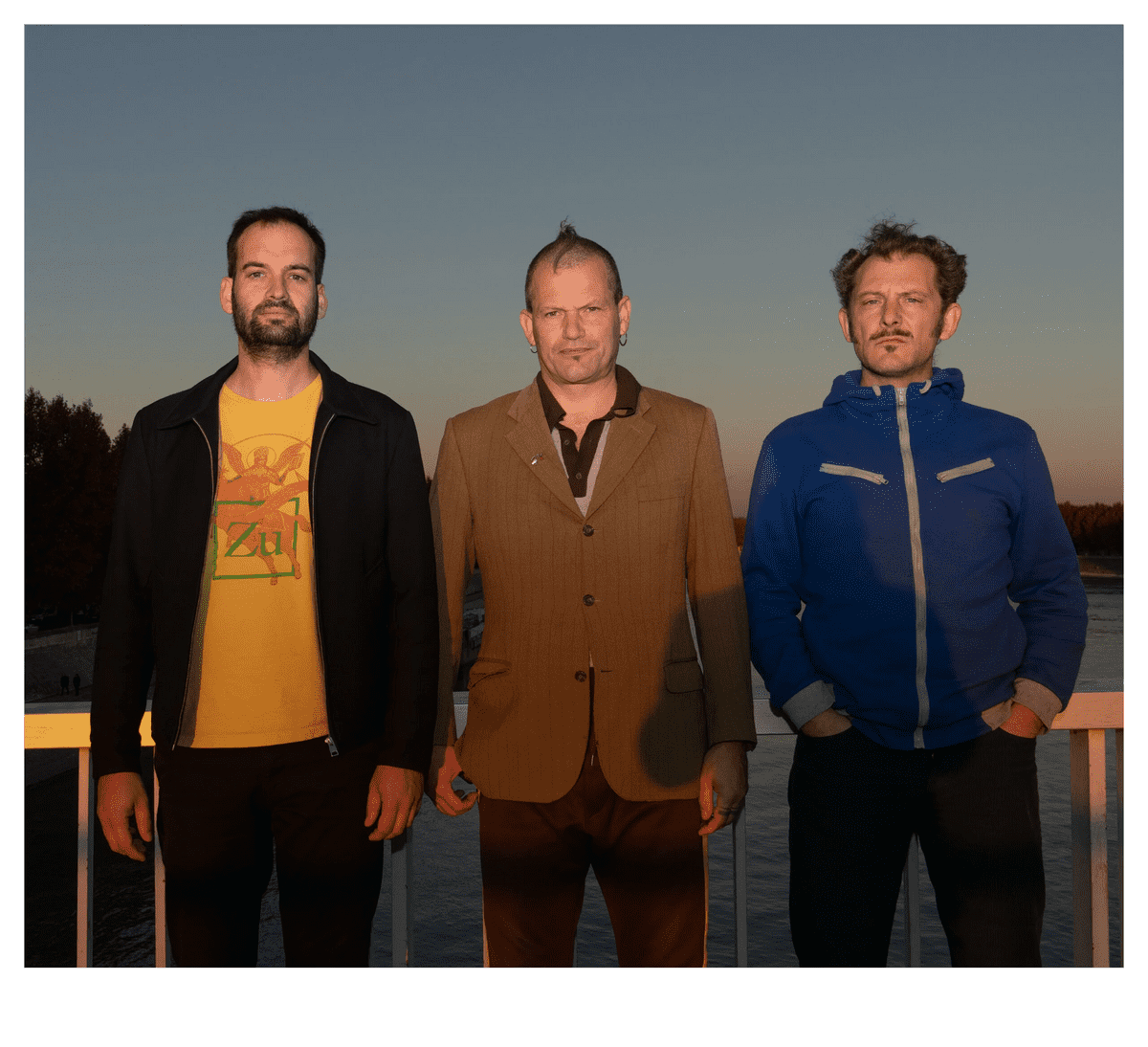
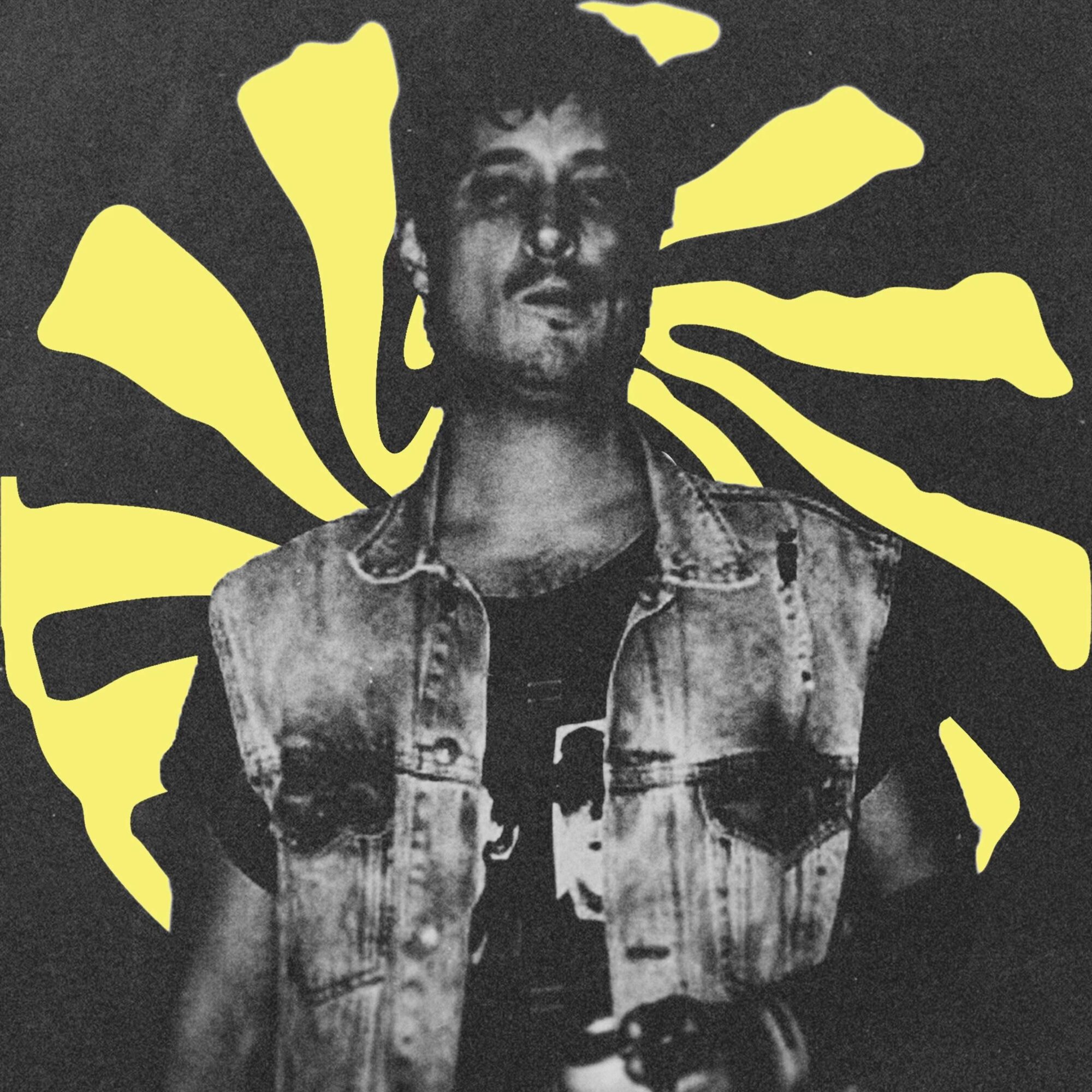
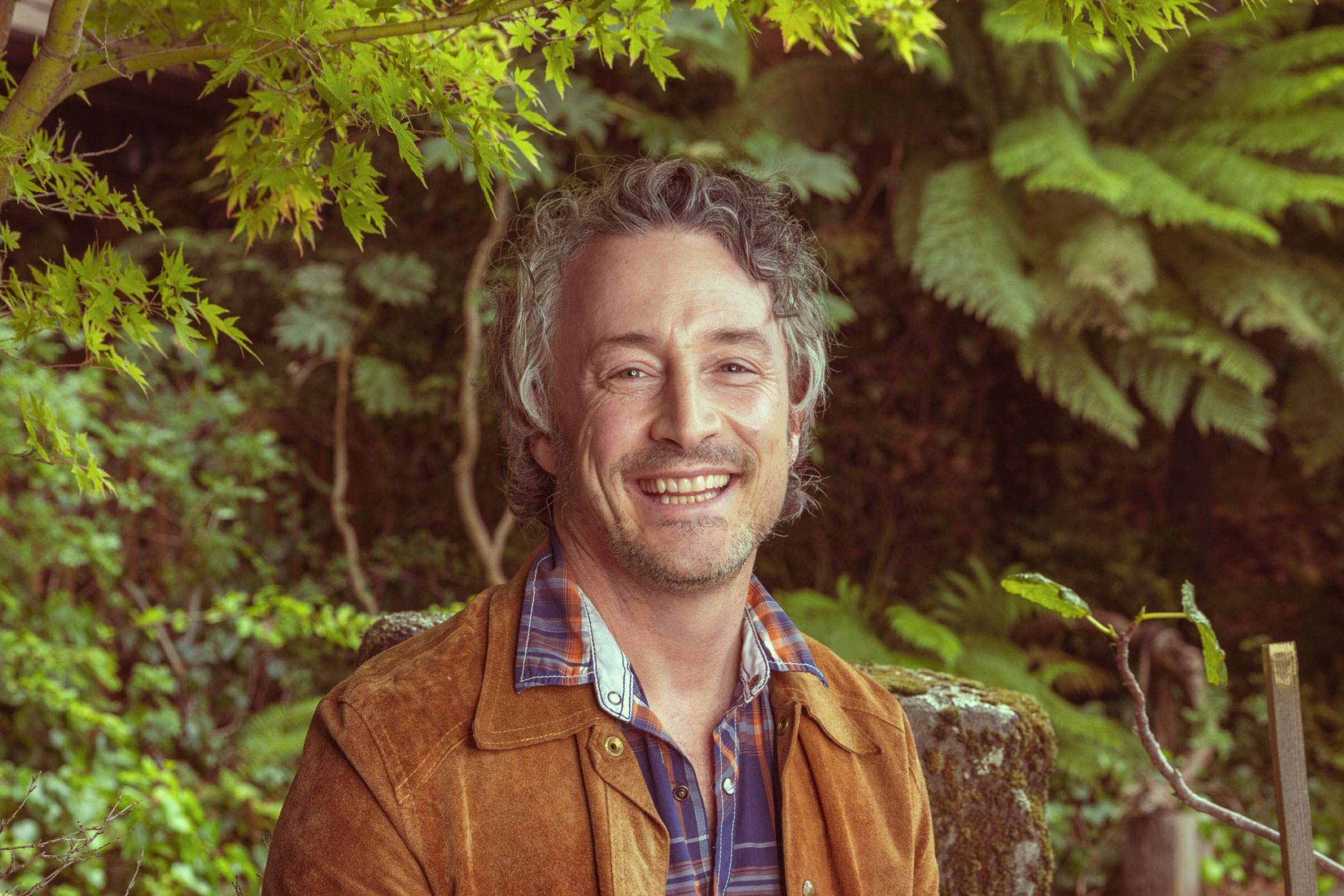
THANK YOU KLEMEN for the punk band i don’t know. Yes very good. I also love punk, it just has to be sophisticated: Rats, Bizarros, Rubber City Rebels, Crims, Forgotten Rebels etc….
It would be nice to see much entries more often on this site.
Omega tribe were one of my favourite in the 80s. The doom and gloom years. Our punk band Scab Union even ‘borrowed’ their dove symbol…. we’re in New Zealand, so there was no chance they’d see it, ha ha.